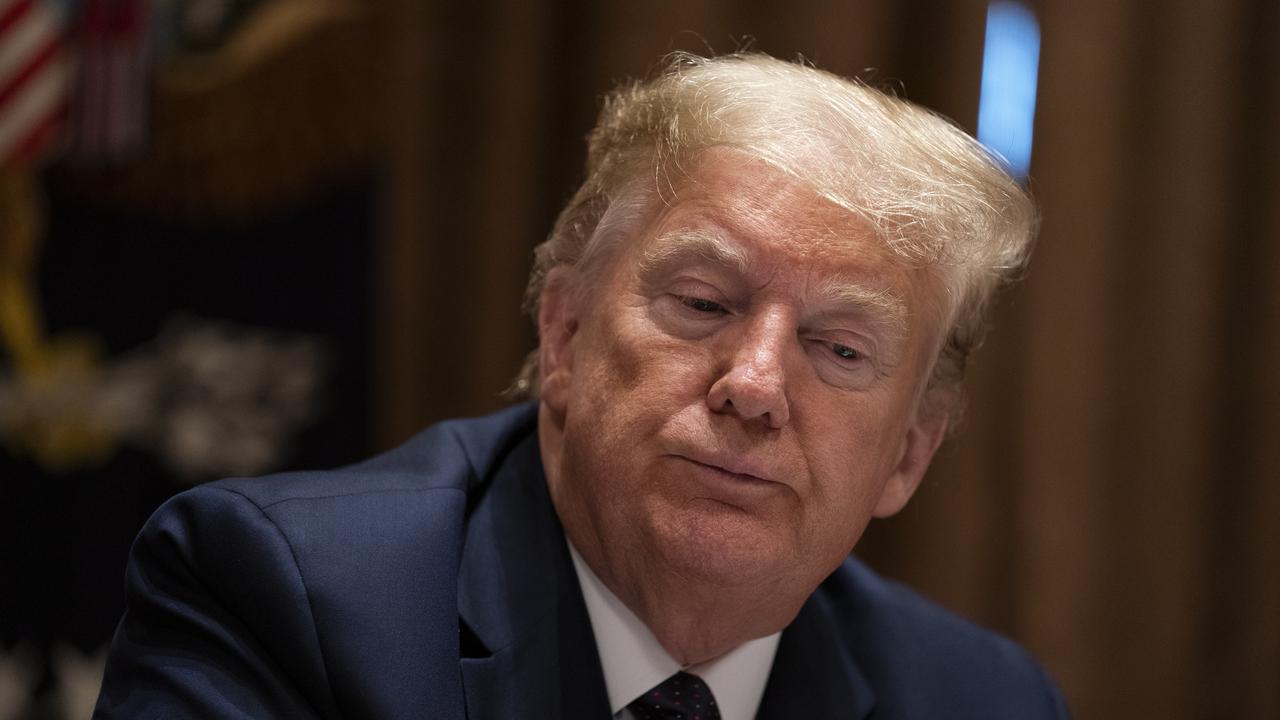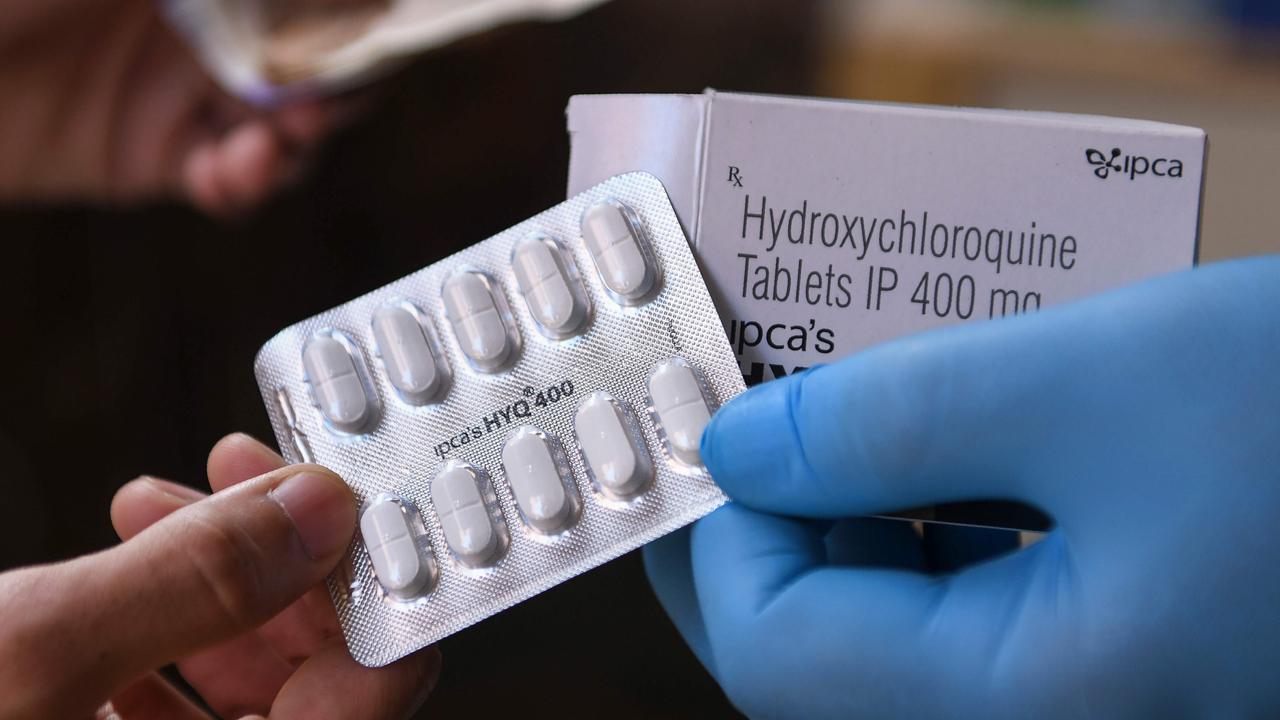TV host warns viewers not to take anti-malarial drug to prevent COVID-19
People have been warned not to copy Donald Trump after he revealed he is taking an anti-malarial drug as a preventive against COVID-19.
Donald Trump raised eyebrows on Tuesday after revealing he takes hydroxychloroquine, a medication he has touted as a “miracle drug” for curing COVID-19.
The President said he had started taking the drug “a couple of weeks ago”, despite warnings from doctors.
RELATED: Trump taking hydroxychloroquine despite health warnings
The drug has raised concerns among health experts, and numerous studies have found it to be ineffective at treating COVID-19 – as well as potentially dangerous.
Fox News host, Neil Cavuto, warned viewers not to follow the president’s example as it could have deadly consequences.
“If you are in a risky population here, and you are taking this as a preventive treatment to ward off the virus — or, in a worst case scenario you are dealing with the virus and you are in this vulnerable population — it will kill you,” Cavuto said.
“I cannot stress this enough. This will kill you.”
The TV host citied a recent study into using hydroxychloroquine as a preventive or treatment for COVID-19 which found that there was benefit using the drug in that way and that it could actually be harmful.
“Whatever benefits the president says this (drug) has, this is a leap that should not be taken casually by those watching at home saying ‘well, the President of the United States says it’s okay’,” Cavuto said.
WHAT IS HYDROXYCHLOROQUINE?
Hydroxychloroquine is a drug commonly used at low doses to help people suffering from rheumatoid arthritis and lupus.
The medicine was originally developed to treat malaria.
But since 2006, it has not been recommended for use in severe malaria due to resistance issues, according to the World Health Organisation.
WHAT HAS TRUMP SAID ABOUT IT?
In April, Mr Trump hailed hydroxychloroquine as a “miracle drug” after a single French study claimed it was a potential coronavirus cure.
“What do you have to lose?” he said during a coronavirus briefing last month. “I’m not looking at it one way or another. If it does work, it would be a shame if we didn’t do it early. But what do I know, I’m not a doctor. But I have common sense.”
IS TRUMP TAKING IT?
Mr Trump this morning revealed he is taking the drug hydroxychloroquine, despite health warnings.
“A lot of good things have come out about the hydroxy. A lot of good things have come out,” Mr Trump told reporters at the White House.
“And you’d be surprised at how many people have taken it, especially the frontline workers, before you catch it. The frontline workers, many many are taking it.
“I happen to be taking it. I happen to be taking it. I’m taking it, hydroxychloroquine. Right now, yeah.”

The President said he had started taking the drug “a couple of weeks ago”.
“Because I think it’s good. I’ve heard a lot of good stories. And if it’s not good, I’ll tell you. I’m not going to get hurt by it. It’s been around for 40 years, for malaria, for lupus, for other things,” he said.
“I take it. Frontline workers take it. Lots of doctors take it. I take it. You know, I hope to not be able to take it soon, because I hope they come up with some answer. But I think people should be allowed to.”
WHAT ARE THE DANGERS OF IT?
Doctors quickly warned that hydroxychloroquine can have severe side effects in some situations, including death.
Common side effects include headaches, nausea, vomiting and diarrhoea. In rarer cases users can experience stomach pain, loss of appetite and weight loss, irritability, skin rashes or itching, and hair loss.
Subsequent studies have suggested the drug is not effective at treating the virus, and might even increase patients’ risk of dying.
BUT DIDN’T THAT FRENCH STUDY SAY IT WAS LEGIT?
In early March, a group of scientists in the southern French city of Marseilles launched an experiment to see if hydroxychloroquine could cure COVID-19.
Before the results had even been published, Gregory Rigano, a lawyer who claimed to be affiliated with the Stanford University of Medicine, publicly declared the results a “100 per cent cure rate against coronavirus”.
Shortly afterwards, Mr Trump hailed the drug as a “game changer”.
But here’s the kicker: Stanford later revealed that Mr Rigano had no affiliation with the school. His endorsement was null and void.
Experts have since concluded the Marseilles study was too small and lacked the detail and rigour to be classed as evidence of a legitimate treatment.
Any drug being used as a cure for a virus before full clinical trials have been completed is, by definition, untested and unproven.
Two weeks after the study was first published online, the International Society of Antimicrobial Chemotherapy, which publishes the IJAA, disputed the results.
“The ISAC Board believes the article does not meet the Society’s expected standard, especially relating to the lack of better explanations of the inclusion criteria and the triage of patients to ensure patient safety,” it said in a statement.
France’s own Health Minister, Olivier Véran, said it shouldn’t be used by anyone with the exception of “serious forms of hospitalisation and on the collegial decision of doctors and under strict medical supervision”.
OK, SO WHAT DOES THE OTHER RESEARCH SAY?
America’s Food and Drug Administration has cautioned against its use for coronavirus outside of a hospital setting or clinical trial, as it can cause “serious heart rhythm problems” and “a dangerously rapid heart rate”.
Last month, an American study was conducted at a hospital for veterans, with 368 male patients.
According to the study, 28 per cent of the veterans who were given hydroxychloroquine plus routine care died, compared to 11 per cent of those getting routine care alone.
And 22 per cent who received both hydroxychloroquine plus the antibiotic azithromycin died, though researchers said the difference between the group and usual care was significant.
Hydroxychloroquine made no difference in preventing needs for a ventilator.
Studies in other countries have yielded similar results. A small French study, led by Jean-Michel Molina and conducted in a hospital in Paris, found hydroxychloroquine reduced neither deaths nor ICU admissions among patients who received it.
Their study found that after five to six days of treatment with hydroxychloroquine and azithromycin, eight of their 10 patients still tested positive for COVID-19. One patient died, two were transferred to the ICU and another had to be removed from the treatment due to serious complications.

A Brazilian study, published in the Journal of the American Medical Association Network Open (Jama), was shut down after two deaths and heart problems among patients who were given a high dose of chloroquine, a drug in the same family as hydroxychloroquine.
A Chinese study showed patients who received the drug didn’t recover any faster or better than patients who didn’t get the drug.
Another hydroxychloroquine study is currently taking place on 20 patients at Upstate University Hospital in Syracuse, USA. Chief of infectious diseases Dr Stephen Thomas said researchers hope to know within a few weeks “if it’s safe and has a clinical benefit”.
ARE THERE ANY OTHER SIDE EFFECTS?
One rare potential side effect of the drug, particularly when taken in conjunction with azithromycin, can be ventricular arrhythmia, which in some patients can prove fatal. A rare side effect means it occurs between one in 1000 and one in 10,000 cases.
SO CAN PEOPLE TAKE THIS DRUG OR NOT?
On its website, the Food and Drug Administration continues to caution against use of hydroxychloroquine or chloroquine for COVID-19, outside of a hospital setting or a clinical trial.
In Australia, patients need a prescription from an appropriate specialist or a repeat prescription from a GP to get the drug. This means they need to have one of the conditions hydroxychloroquine is currently approved for. (Generally doses given for these conditions are much lower than doses that had been given for coronavirus treatment.)
The drug itself is still considered safe for treatment of pre-approved conditions.
The key point here is that COVID-19 isn’t yet one of them, and we don’t know if it ever will be.



